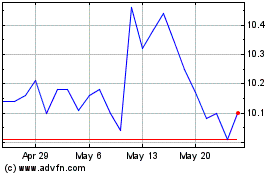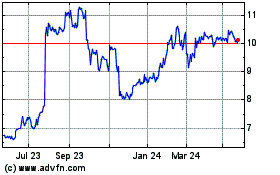Puerto Rico's debt crisis moved into a more treacherous phase
for residents, lawmakers and bondholders Monday, with the expected
default by the Government Development Bank on a $422 million
payment.
The likely missed payment, the largest so far by the island, is
widely viewed on Wall Street as foreshadowing additional defaults
this summer, when more than $2 billion in bills are due.
Together with the spread of the dangerous Zika virus, the risk
of cascading defaults is putting new urgency on delicate bipartisan
negotiations in Washington over legislation granting new powers to
restructure more than $70 billion in debt issued by the
territory.
Treasury Secretary Jacob Lew warned on Monday that a U.S.
"taxpayer-funded bailout may become the only legislative course
available" if Congress doesn't approve the proposed restructuring
legislation. The warning came in a letter sent to Congress.
The island's debt is held by mutual funds, hedge funds, bond
insurers and individual investors, who were attracted in part by
tax benefits and high yields. Any GDB default Monday would cast
serious doubt on the commonwealth's ability to make other future
payments, which "means that other defaults are very likely on other
Puerto Rico credits," said Paul Mansour of the investment
management firm Conning.
The government will make a $22 million interest payment due
Monday, a GDB spokeswoman said, but it will likely miss a $367
million principal payment. The government earlier swapped $33
million worth of debt coming due Monday for new debt with later
maturities, the spokeswoman said.
A provisional deal announced Monday with hedge funds holding
about $900 million of GDB bonds shows the complex lengths that
Puerto Rico's leaders must go to as they wait for Congress to
establish a legal framework for a broader restructuring. Under the
proposed swap, bondholders would swap into new GDB bonds worth
about 57% of their original claims, but would exchange that debt
yet again, and take a bigger haircut, if the island achieves a
global restructuring
Monday's developments amount to the latest sign that a
long-running economic crisis has reached an acute stage, embroiling
financial markets and the U.S. political process. Benchmark Puerto
Rican bond prices fell to near record lows Monday, with some
investors paying less than 65 cents on the dollar for general
obligation bonds maturing in 2035. Just two years ago, investors
snapped up $3.5 billion of those bonds, which carry an interest
rate of 8%. Prices dropped below 64 cents on the dollar only once,
when Puerto Rico passed a law last month allowing the suspension of
debt payments.
While Monday's default had been expected, the missed payment
creates new headaches for the local government. Its agencies
maintain their bank accounts at the GDB, which serves as the
government's fiscal agent and financial adviser and backs loans to
private enterprises, so the default could trigger litigation to
freeze those accounts. The government had already passed
legislation to limit withdrawals from the agency to avoid a
potential bank run, and the commonwealth's treasurer last month
began opening accounts at private banks.
Puerto Rican Gov. Alejandro Garcí a Padilla had said in a
televised address Sunday that the island was struggling to pay for
such basic goods as fuel for police cars.
"We simply don't have enough money to pay for all these services
and pay our creditors," he said.
The default could also mark a turning point after weeks of
negotiations on Capitol Hill. House Republicans are completing
legislation to create a federal oversight board with the power to
sign off on local budgets and to authorize a court-supervised debt
restructuring. The bill wouldn't commit U.S. taxpayer funds, but
some creditors have described it as a bailout because they say it
might violate existing contracts.
House Speaker Paul Ryan (R., Wis.) has forcefully rallied
Republicans to back the legislation, the product of unusually
bipartisan discussions with the Treasury Department. Mr. Ryan is
warning colleagues that, if the local government can't manage the
crisis, calls for actual taxpayer assistance will mount.
"The longer this goes on, the more likely there will have to be
a federal bailout," said Marc Joffe, a former senior director at
Moody's Investors Service who is now principal consultant at Public
Sector Credit Solution, a research group.
Mr. Garcí a Padilla hasn't said what he would do if Congress
doesn't agree on legislation. He denounced a multimillion-dollar
lobbying effort against the bill, backed by various creditors, as a
"brutal campaign of racial discrimination and lies," and he said
failure by Congress to address the crisis "could become a public
embarrassment for the United States."
Puerto Rico, whose residents are U.S. citizens, has been mired
in recession for a decade and borrowed heavily to balance budgets.
Despite the shaky economy, investors snapped up its debt for years
thanks to generous tax incentives. The borrowing spree, however,
did little to create economic opportunity on the island, and
residents have steadily left for employment on the U.S. mainland,
eroding Puerto Rico's tax base.
More recently, the Zika virus is threatening to strain the
island's public health infrastructure while damaging its tourist
sector. The Centers for Disease Control and Prevention reported
last week the first U.S. death related to the Zika virus, that of a
Puerto Rican man in his 70s who died in late February.
Puerto Rico's debt crisis isn't seen as likely to spill into the
U.S. economy or the broader $3.7 trillion municipal bond market
because the island's unique set of economic troubles make it
something of an outlier.
Congress is considering legislation because the commonwealth's
public institutions don't have access to federal bankruptcy courts,
unlike municipalities in U.S. states. Because Puerto Rico isn't a
country, it can't turn to the International Monetary Fund for
assistance.
Despite weeks of close negotiations, the Treasury hasn't blessed
the bill. Officials say restructuring provisions can't allow
creditors to drag their feet in any workout. Conservative
Republicans, meanwhile, are seeking assurances that the legislation
wouldn't set a precedent for distressed states, for example, to
write down debt in order to shore up public pensions.
The battle in Congress boils down to one about leverage.
Treasury and Puerto Rico want a process that makes it easier to
restructure debts because this will give the island's financial
advisers more leverage in negotiations with bondholders. Creditors
want one that makes it impossible to restructure debts or void
contracts because this preserves their leverage.
Mr. Ryan is caught in the middle. As bondholder advocates lobby
against the bill, he risks losing Republicans. This would force him
to choose whether to push through a bill with predominantly
Democratic support.
Treasury says a broad restructuring regime is needed in part to
avoid litigation between creditors who hold debt with differing
security pledges and who are likely to sue each other to make
claims on the island's dwindling revenues. Creditor battles,
officials say, could prolong the debt crisis for years and chill
private investment in Puerto Rico.
Meantime, bondholders have accused the local government of
refusing to negotiate in good faith and, together with the Obama
administration, of exaggerating the crisis in order to compel
federal legislation.
Last year, the island made several debt payments only after
taking emergency measures, such as withholding tax refunds and
delaying payments to local contractors.
Write to Nick Timiraos at nick.timiraos@wsj.com, Heather Gillers
at heather.gillers@wsj.com and Matt Wirz at
matthieu.wirz@wsj.com
(END) Dow Jones Newswires
May 02, 2016 16:35 ET (20:35 GMT)
Copyright (c) 2016 Dow Jones & Company, Inc.
Pacific Current (ASX:PAC)
Historical Stock Chart
From Apr 2024 to May 2024

Pacific Current (ASX:PAC)
Historical Stock Chart
From May 2023 to May 2024
